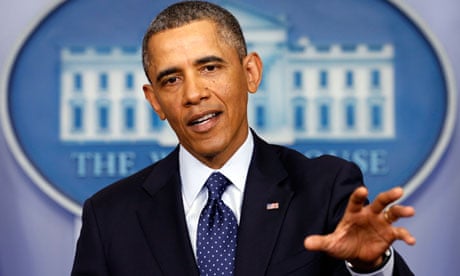The sequester talks drone on while congressional Republicans and President Obama cannot reach an agreement to stop it. Obama hopes that the public will force congress's hand by dint of their unpopularity, but Republicans seem content to muddle the field enough so that neither side holds a public relations edge. I think the Republicans are right, even though the president may have the power to turn it around.
More Americans trust Obama on the sequester than Republicans, but the margin between the two seems to be down. Obama held a 26pt lead over congressional Republicans in December per Pew Research, which dropped to 18pt in mid-February and 13pt by the end of the month. After the sequester took effect on 1 March, CBS, which has generally found better numbers for Obama than other pollsters, had the margin down to 5pt.
Interestingly, a lot of this movement isn't because more people are blaming Obama alone – more people are blaming both parties equally. The percentage of Americans blaming Obama was at its lowest 27%, and now rests at 33%. The percentage blaming just the Republicans has dropped from 53% in December to just 38% in March. The percentage blaming both sides or neither equally has risen from 20% in December to 29% now.
We see this split reflected in the approval ratings for Congress and the president. Congress continues to have approval ratings matched only by those for Lance Armstrong. The president's approval ratings have, however, slid down from their post-election high; they're now below 50% in the Real Clear Politics average, the first time since his re-election.
What's happening?
First, it was unlikely that Americans would continue to blame just Congress. The president is, rightly or wrongly, going to get some flak when things go wrong. That's why the president's party loses when the economy is bad and wins when it's good, even though the president really doesn't have too much control over the economy.
Second, since congress is still massively unpopular, we can't expect the public to only blame Obama. If you ask someone whether you can blame a snow storm on cold weather or the precipitation, chances are they will blame both.
Third, Americans are actually split between Obama's and the Republicans' general positions. Obama wants a "balanced" approach of new tax revenue and spending cuts. Republicans just want to cut taxes. Most polls indicate that Americans do want a compromised approached, but few of these polls break down what "balanced" means, exactly. The only poll to do so is a recent Fox News poll.
The percentage of Americans who want an equal mix of tax increases and spending cuts is 36%, which is statistically equal to the 33% who only want cuts. The true middle ground are the 19% who want mostly spending cuts with a small number of tax increases.
So how does President Obama get the public back on his side? He needs to make this debate about specifics. When Pew tested different policies on reducing the deficit, people only agreed on cuts to foreign aid. Americans wanted to increase or keep funding the same for all other specific policy programs or proposals.
The president could reach this goal in two ways. He could try something dramatic, like a government shutdown, as suggested by my friend Nate Cohn. This tactic would force the public to look very closely at the specifics.
The president could also try to use the bully pulpit. As the president knows, he cannot magically persuade the public to agree with his positions. Studies do show, however, that the president can highlight positions that are already popular with the public, and thus force the public's will upon Congress.
Get that? Broad generalities on cutting spending do very well with the public. Specific ones do poorly. Every time the president talks about generalities like a "balanced" budget, he's playing on turf far more favorable to Republicans.
You might say though that the president is still "playing to tie". The truth, though, is that presidential approval seems to be more predictive of midterm elections outcomes than congressional approval. If the president's approval rating drops, then congressional Democrats will end up paying the price. We saw this in 2010 midterm blowout: the public actually blamed Republicans more than Democrats, but the president's approval rating was low and Republican winners stormed Congress.
Now, this isn't to say that using specifics will immediately turn the fight in favor of Obama and the Democrats. I will say, though, that the president's current strategy isn't working. Even if congressional Republicans aren't "winning", they will be more than happy to see the president "not "winning".
